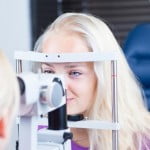![[Close up of a blue eye]](https://cdn1.medicalnewstoday.com/content/images/articles/304/304855/close-up-of-a-blue-eye.jpg)
A recent study, published in the journal Cancer, followed up patients who had, in their youth, survived retinoblastoma – atumor of the eye.
Survival rates for retinoblastoma in America are excellent; the 5-year survival rate is around 97%. However, little information is available regarding the survivor’s future illness and well-being.
Previous studies into the health in later life of retinoblastoma survivors have been limited in sample size and scope.
Researchers at the Memorial Sloan Kettering Cancer Center in New York City, NY, decided to cast their net a little wider. What did the future hold for these children?
Contents
What is retinoblastoma?
Retinoblastoma is an eye cancer that begins in the retina and can spread to the brain or spinal cord. It most commonly affects children under the age of 4 and rarely occurs in adulthood. The cancer can occur in one or both eyes.
Retinoblastoma is the most common cancer of the eye in children and accounts for around 3% of all childhood cancers.
Although many of the precise causes of retinoblastoma have not been described in detail, it is known to involve certain genetic mutations that cause nerve cells in the retina to grow out of control. There is also a proven familial component to the disease.
The long-term impact of surviving retinoblastoma
The research team delved into data from the Childhood Cancer Survivor Study. They compared 470 retinoblastoma survivors, diagnosed between 1932-1994, with 2,377 control individuals of comparative age, sex and race, who had not had retinoblastoma.
The cancer survivors used in the trial were followed up for an average of 42 years, giving a solid picture of their health throughout the years.
The team found that retinoblastoma survivors were indeed at risk of health issues further down the line when compared with controls. Secondary cancers were prominent, particularly in the group of cancer survivors who had experienced retinoblastoma in both eyes. These individuals are known to have a genetic predisposition to developing new cancers.
On a more positive note, when the researchers removed new cancers and vision problems from the data, they found that individuals who had retinoblastoma in just one eye had no significant decrease in health compared with people of a similar age, sex and race.
In fact, the overwhelming majority of retinoblastoma survivors rated their health as “excellent to good.”
Dr. Novetsky Friedman, study lead, says:
“Novel data presented in this report will guide practice for oncologists, ophthalmologists, survivorship practitioners, and primary care providers involved in the long-term care of survivors of retinoblastoma by helping them identify those at highest risk for medical problems.
Appropriate lifelong risk-based screening of this population will allow for timely treatment of any medical problems that may arise.”
The long-term psychological impacts of vision impairment
Alongside this new research, an accompanying article was included, written by Dr. Peter de Blank, of Case Western Reserve University School of Medicine and UH Rainbow Babies & Children’s Hospital in Cleveland, OH.
Dr. de Blank also used data from the Childhood Cancer Survivor Study. He looked at the health and psychological impacts of blindness and visual impairment in children who survived astroglial tumors.
Of the 1,223 survivors of brain tumors, 22.5% had visual impairments. He found that vision loss in childhood did not affect psychological well-being in adulthood. But, for individuals who were blind in both eyes, there were some negative impacts on their lives.
Those who had blindness in both eyes were more likely to be unmarried, unemployed and living with a carer than survivors with impairments in only one eye. The team also noted that the chemotherapy treatment for cancers impacting the visual system fell into three evenly distributed categories:
- One third of patients’ vision improved
- One third of patients’ vision stabilized
- One third of patients’ vision deteriorated regardless of treatment.
Dr. de Blank says:
“We hope that this study will help inform therapeutic decision-making as patients consider the risks and benefits of therapy.
And, for the third of patients whose vision will continue to deteriorate, we hope that this study provides some evidence that, for many survivors, the long-term effects of vision impairment do not have to impact their long-term psychological or socio-economic outcomes.”
Medical News Today recently reported on a potential cure for age-related blindness.
[SOURCE :-medicalnewstoday]


